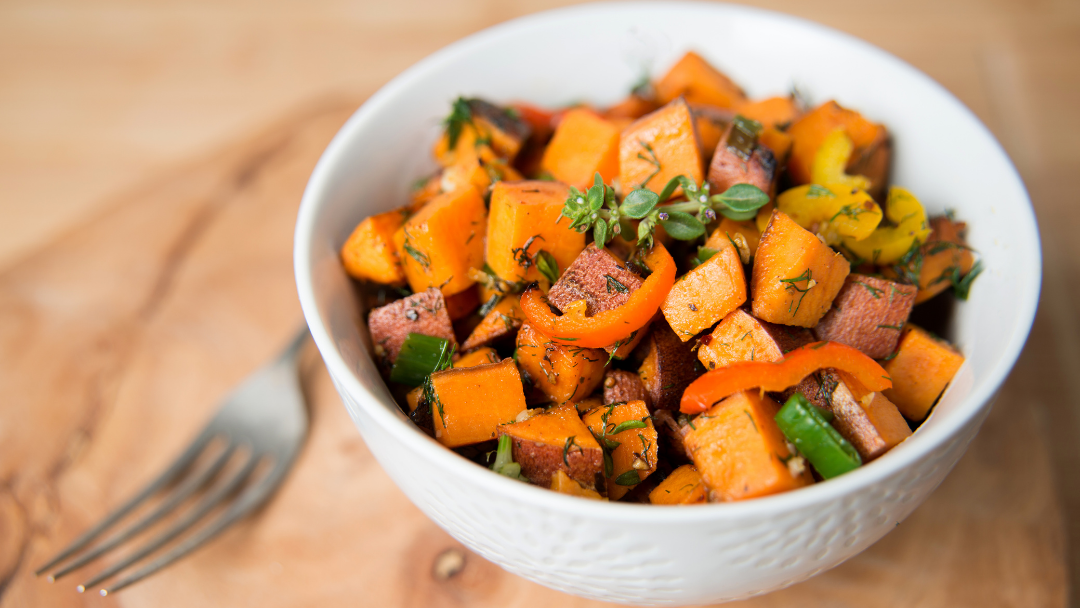Photo: Anna Hoychuk/Shutterstock.com
Glycation is the process through which a molecule (i.e., protein, amino acid, lipid, DNA) attaches to a carbohydrate. While glycation is a normal process, advanced glycation end products (AGEs) are of concern as they may become harmful to health. AGEs are substances formed through the Maillard reaction when protein and fat combine with sugar. This process occurs within the body or through the consumption of foods that contain AGEs, either naturally high in them or produced through the cooking process.
In the body, AGEs accumulate in tissues, which may explain their relation to disease pathologies, including Alzheimer’s disease, cancer, atherosclerosis, and nephropathy. AGE accumulation may also play a role in schizophrenia and psychotic symptoms. While it is generally well-established that AGEs affect cardiovascular and renal systems, newer research aims to identify the effects on gut health, which may decline due to altered absorption and metabolism of nutrients, intestinal health, and gut microbiota diversity.
Individuals with type 2 diabetes may have more AGEs due to chronically elevated blood glucose levels, which can contribute to the formation and accumulation of AGEs. AGEs may cause disease complications by activating oxidative stress (OS) and inflammatory pathways. They also result in low insulin secretion and high beta cell death, furthering disease progression.
Other factors that increase AGEs include alcohol consumption (especially excess), smoking habits, high-fat diets, high-calorie diets, excess processed foods, poor renal health, high blood sugar, and inflammation.
Oxidative stress, aging, and AGEs
As the acronym hints, AGEs are associated with accelerated aging. In addition to the correlation of AGEs with diseases, AGEs may contribute to physical decline in older adults through osteoporosis, osteoarthritis, and muscle wasting. As AGEs accumulate in tissues throughout the body, they may directly increase OS, which is thought to accelerate aging.
OS is a normal consequence of metabolism that only becomes problematic when left chronically elevated or if the body’s antioxidant capacity is compromised. If OS remains elevated, it will continue to increase, further contributing to AGE formation, resulting in cell death and damage and disrupted cell signaling. These outcomes are connected to age-related issues and diseases.
How to reduce AGEs in your cooking
Foods are likely a greater source of AGEs than what is produced in the body, making food the controllable factor. Low AGE foods are fruits, veggies, whole grains, and milk products. However high-fat and high-protein foods, especially those from animal sources, are already high in AGEs, and their cooking/processing increases them. Fortunately, there are ways to minimize AGEs in your cooking.
Strategies to avoid AGEs in cooking:
- Cook at low-medium temperatures: “Browning” food (e.g., grilling, frying, smoking) increases AGEs in the cooking process. Of note, AGE formation is significantly lower with air frying versus traditional deep-frying methods. This is likely due to the lower fat usage in air frying. Air frying may also prevent the precursor substances of AGEs from forming.
- Avoid dry heat cooking: Include water or moisture while cooking. AGEs are high in dry foods, such as baked goods, cereal, cheese, and meat.
- Decrease the pH of food: High pH in processed foods leads to more AGEs. You can minimize AGEs by cooking with lemon juice or vinegar.
- Cook for shorter durations: Longer cooking times increase AGEs.
- Avoid storing foods for too long: The longer you store foods, the greater the possibility for more AGEs to form. AGE formation during food storage may depend on temperature and moisture content. Fat and protein oxidation, which are associated with food spoilage, may also contribute to AGEs.
- Use spices in your cooking: Spices have antiglycation and antimicrobial properties, are potent sources of antioxidants, and act as natural food preservatives.
How spices can help
Adding spices to your cooking is a great way to minimize AGEs. You can incorporate them as fresh herbs or dried powders in practically any meal. Increasing spices in meals may even help enhance the flavor of a low-salt diet because they improve the enjoyability of meals. What’s more, spices help prevent food spoilage caused by lipid peroxidation and have antimicrobial properties against yeasts, mold, and bacteria. Plus, spices are great sources of antioxidants that can combat inflammation caused by AGEs.
Which spices are best?
The top spices to reduce glycation are allspice, star anise, cloves, cinnamon, and oregano. See the table below for suggested uses.
| Spice | What does it do? | Part to use | How to add it |
| Allspice | ● Considered an active scavenger of free radical-causing OS
● Potent antiglycation spice |
Generally ground but sometimes infused in liquids whole | Baked recipes, marinades/sauces, sausage or meatball flavoring, soups, pickling brines |
| Star anise | ● Most potent antiglycation spice, above cinnamon, allspice, and cloves | Whole if infused in liquids or ground | Soups, stews, broths, teas, braising sauces |
| Cloves | ● Potent antioxidant that significantly inhibits OS | Whole or ground | Infused in liquids (e.g., teas, cider), braising sauces, Indian dishes, pumpkin/squash recipes, baked recipes |
| Cinnamon | ● Antiglycation due to antioxidant content | Generally ground but sometimes infused in liquids whole | Oatmeal, porridge, baked recipes, infused in liquids, savory flavor in many cuisines |
| Oregano | ● Significantly inhibits formation of AGEs due to antioxidant properties
● Protects LDL from glycation and oxidation ● Prevents AGEs when cooking meats |
Leaves, stem, oils | Marinades, soups, stews, casseroles, sprinkled on meat, added to salads, teas |
Final considerations
Diet and lifestyle are important risk factors in disease development, progression, and management. While it’s true that nutrition and lifestyle choices can improve long-term health, we cannot avoid all instances of glycation in our lives. Taking action to minimize AGEs in your foundational diet, improving sleep quality, and prioritizing stress management will help reduce the burden of AGEs in your body and your diet.
If you have questions about AGEs or which spices and foods can best support your health, talk to your doctor, nutritionist, dietician, or another healthcare team member for personal options based on your circumstances. Note that spices can affect the metabolism of medications, so consult your pharmacist if taking prescription drugs.





